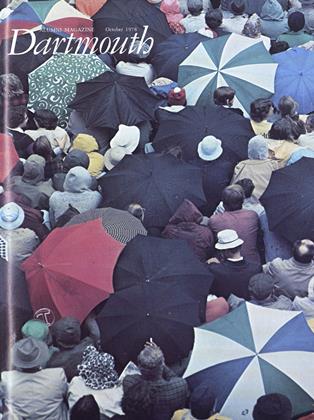TISH DAVIS and Ginger Cox spent their summer vacation dodging pods of whales and icebergs. Davis, a senior from Kirkland, Washington, and Cox, a year past graduation, teamed up to row and sail a 20-foot, 250-pound boat 1,152 miles from Seattle, Washington, to Skagway, Alaska, in 72 days.
They were buzzed by seaplanes and greeted by boats in Skagway Harbor after completing the voyage through the famed Inside Passage. After the two adventurous women jumped into the 45-degree harbor water (they hadn't had a shower in ten days), Skagway took them in with open arms, providing food, lodging, and, instead of a key to the city, a print of the harbor.
The row was Cox' idea. "I've wanted to go to Alaska since I was a little kid," she said. "I thought of this trip years ago and everyone would laugh when I talked about it. Finally, I found someone else. who thought it was neat and wanted to clo it, too." i.
Their craft, a custom-built Norwegian faering, was rigged with a mast and sail. The sail, used for only 62 miles of the trip, was a safety precaution against storms. A shelter was rigged from the mast to protect the women from the weather and sun. Their diet, adapted from one for a 30-day Outward Bound canoe trip in the Arctic, consisted largely of grains, nuts, fruit, and whatever their fishing and clam-digging gear harvested.
Both women are experienced rowers. Tish Davis captained the Dartmouth women's crew this year. In 1977, she teamed with Rene Verdin '77 to win the pairs competition and finish second in the doubles at the Henley Regatta in Canada. They duplicated the performance a couple of weeks later in the Canadian National Championships. Less than a week before beginning the Seattle-to-Skagway passage, Davis competed in an eight-oared shell, entered by the Dartmouth Rowing Club, in the women's national rowing championships at Seattle. Cox, too, is no novice with the oars. She was co-captain of the women's crew at Dartmouth during her senior year, and, as a junior, rowed in a boat that won the Eastern Sprints. Graduation has not cooled her interest in rowing. She practices at least 90 minutes every morning, regardless of weather, on Lake Sammamish or Lake Washington near Seattle. Cox competed in the June Nationals under the colors of the Lake Washington Rowing Club.
The well-researched row to Skagway was not done for personal satisfaction alone. Davis and Cox also did it as a Rowathon to raise money for a Jaycee camp near Seattle for juvenile delinquents. Their journey was closely followed by a Seattle radio station, which received progress reports whenever the women could get to a phone along the route. They had hoped to log about 20 miles a day during good weather, but managed to sail the last 77 miles from Juneau to Skagway in two days. That leg could have taken as long as a week.
The Foss Tugboat Company of Seattle brought their boat home free of charge, and it was displayed at the Fort Townsend, Washington, boat show in September. Davis and Cox received nation-wide recognition for their efforts, including a plug on Paul Harvey's noontime news-commentary radio program. The Dartmouth pair's exploits were used as a kicker after a story about few women being able to pass the FBl's strength and stamina tests. Davis and Cox wouldn't have heard this praise, however. Three days after they landed in Skagway, on the same day of the radio broadcast, the rowers were hiking the 33-mile Chilkoot Mountain Trail, which miners used during the Alaskan Gold Rush 80 years ago.
 View Full Issue
View Full Issue
More From This Issue
-
 Feature
FeatureThe Lady and the Truckers
October 1978 By Mary Ellen Donovan -
 Feature
FeatureBeauty and the Beasts
October 1978 By William Morgan -
 Feature
FeatureConundrum of the Gridiron
October 1978 By Jack DeGange -
 Feature
FeatureA Matter of Perspective
October 1978 -
 Article
ArticleSignal-Caller for the Hurt
October 1978 By D.M.N. -
 Article
ArticleOffice of Development Report of Voluntary Giving
October 1978
Article
-
 Article
ArticlePresident's Engagements
FEBRUARY 1932 -
 Article
ArticleVISUAL AIDS TO LEARNING
November 1945 By C. N. ALLEN '24 -
 Article
ArticleFifty Years a Doctor
February 1941 By David N. Blakely -
 Article
ArticleBeware the Shrimp
Jan/Feb 1981 By Don Rosenthal '81 -
 Article
ArticleElder Statesmen
May 1949 By PROF. ALLEN R. FOLEY '20 -
 Article
ArticleVacation Preparations
January 1935 By The Editors

